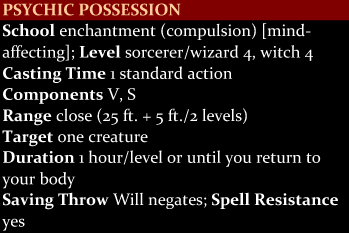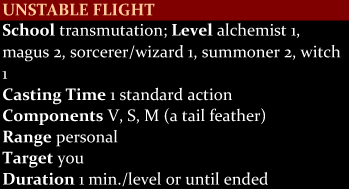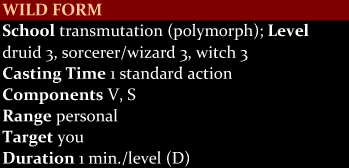Unsafe Spells
One of the things that makes magic feel magical is that it’s wild and unpredictable. When you start to codify magic, and break it down into simple, straightforward, and easy-to-understand rules, it starts to lose part of what makes it magic. Unfortunately, in order for magic to be a meaningful force in a tabletop roleplaying game, it really needs rules, and needs to be codified, which means that extra care should be taken, wherever possible, to make sure that magic still feels magical.
The following spells aim to do so by adding an element of risk into the spell—if things go well, and the caster is able to keep control of the magic, it will provide a very powerful effect for its level. But if they go wrong, the caster will find the magic backfiring and turning against him, as though punishing him for meddling in things outside his ken. I hope you find the results useful in your game.
Psychic Possession

This spell allows you to transfer your consciousness into a nearby creature, possibly taking control of their body. Unlike the similar magic jar spell, however, the target’s mind and spirit remain in their body, and struggle for control against you, making the spell a risky proposition to all but the most iron-willed of mages.
While your mind is away, your body remains comatose and all but lifeless. A successful Heal check (DC 15) reveals that you are not dead, but you are unable to control your body, and it is considered helpless and unaware of everything around it.
Once your mind enters the target, you and the target immediately make opposed Will saves. There is no DC for these Will saves, but rather whoever gets the higher result is considered the “winner.” If you lose, the target retains control of its body. If you lose by more than 5, the target may choose to repel your mind from his body and return it to your own body, ending the spell. If you win, you gain control of the target’s body, and if you win by more than 5, the target may not make any more Will saves to attempt to retain control of its body for the rest of the spell’s duration. Otherwise, a new opposed Will save is made every hour that the spell continues. Regardless of who is in control, the target is aware of your presence in his body, and you can communicate telepathically with the target.
While you are in control of the target’s body, you retain your Intelligence, Wisdom, and Charisma scores, as well as your level, class, base attack bonus, base saving throws, alignments, and mental abilities. You use the target’s Strength, Dexterity, Constitution, hit points, natural abilities, and automatic abilities. Even if the target has extra limbs, you cannot use them to make more attacks (or more advantageous two-weapon attacks), and you can’t choose to activate the target’s extraordinary or supernatural abilities, nor can you make use of any spellcasting or spell-like abilities the target may have possessed (although you can use your own spellcasting or spell-like abilities). As long as you are in control, you can choose whether or not to allow the target’s mind to observe your actions, or to remain “blacked out,” and unaware of what you are doing.
While the target is in control of his body, you are unable to take any action, but can see and hear everything that the target does. The target retains complete control of his actions, and retains his own ability scores and special abilities.
You can attempt to leave the target’s body and return to your own at any time as a full-round action. If you are in control, or the target does not want to stop you from leaving his body, you automatically succeed. If the target is in control, however, and does not want to let you leave, you must succeed on a Will save (DC 10 + the target’s Intelligence modifier + the target’s Wisdom modifier) or be unable to do so for 1 hour. Similarly, any time that the target beats you on an opposed Will save by more than 5, and would be able to repel you from the target’s body, he can instead choose to keep your mind trapped in his body for the spell’s duration, at which point you are unable to leave the target’s body until the spell’s duration expires.
At the end of the spell’s duration, you are automatically returned to your body. You also return to your body if the target is slain, or through the various methods outlined above. No matter what causes you to return to your body, you do so immediately, regardless of distance. If your body is dead, is on another plane, or is currently occupied by someone or something else, your mind is left without anywhere to return to, and you die. Those that die in this way often become ghosts, maddened by their experience.
Unstable Flight

Unstable flight allows you to fly by wrapping you in magical energies that propel you through the air. These energies are difficult to control, however, and can be very taxing on the mind. You are affected as though by the spell fly, except that each round that you end your turn not on solid ground, you must succeed on a concentration check or begin to fall. The DC for this concentration check is 15, plus 2 for every 10 feet you are off of the ground. Additionally, you suffer a cumulative -2 penalty for each consecutive minute you have been off of the ground. Landing on the ground, even for 1 round, removes this penalty. If you ever fail one of these concentration checks, the spell ends immediately.
Wild Form

With this spell, you transform your body into that of a wild creature, but the weak-willed find that it transforms their minds as well, overwhelming them with animal instinct. The spell functions as beast shape III, except that the caster must succeed on a Will save (DC equal to the spell’s saving throw DC) immediately upon transforming, or else be transformed mentally, as well as physically.
If this Will save fails, then for the spell’s duration, you lose any extraordinary, supernatural, and spell-like abilities, lose the ability to cast spells, and gain the alignment, special abilities, and Intelligence, Wisdom, and Charisma scores of your new form, in place of your own. You still retain your class and level, as well as all benefits deriving therefrom (such as base attack bonus, base saving throws, and hit points). You also retain any class features other than spellcasting and extraordinary, supernatural, and spell-like abilities. Additionally, for the duration of the effect, you no longer retain any part of your memory or personality, and instead act as a normal specimen of the new form you have transformed into, potentially running off, attacking your allies, or worse. Finally, if you fail this Will save you cannot dismiss the effect.
If you do fail the Will save, then when the spell’s duration ends, there is a 10% chance that you do not return to normal, but instead remain trapped in your new form, with your new mind. In this case, you may make a new Will save to regain your mental faculties after 24 hours, and again after one week, one month, and one year. If any of these saves is successful, the spell’s effect ends, and your body and mind both return to normal immediately. Further, during this time, the spell can be ended with remove curse, dispel magic, or more powerful spells, and this restores your mental abilities, as well. After one year, however, your mind is sufficiently eroded that even if your body is restored, your mental faculties cannot be recovered without the use of limited wish, or more powerful magic.


